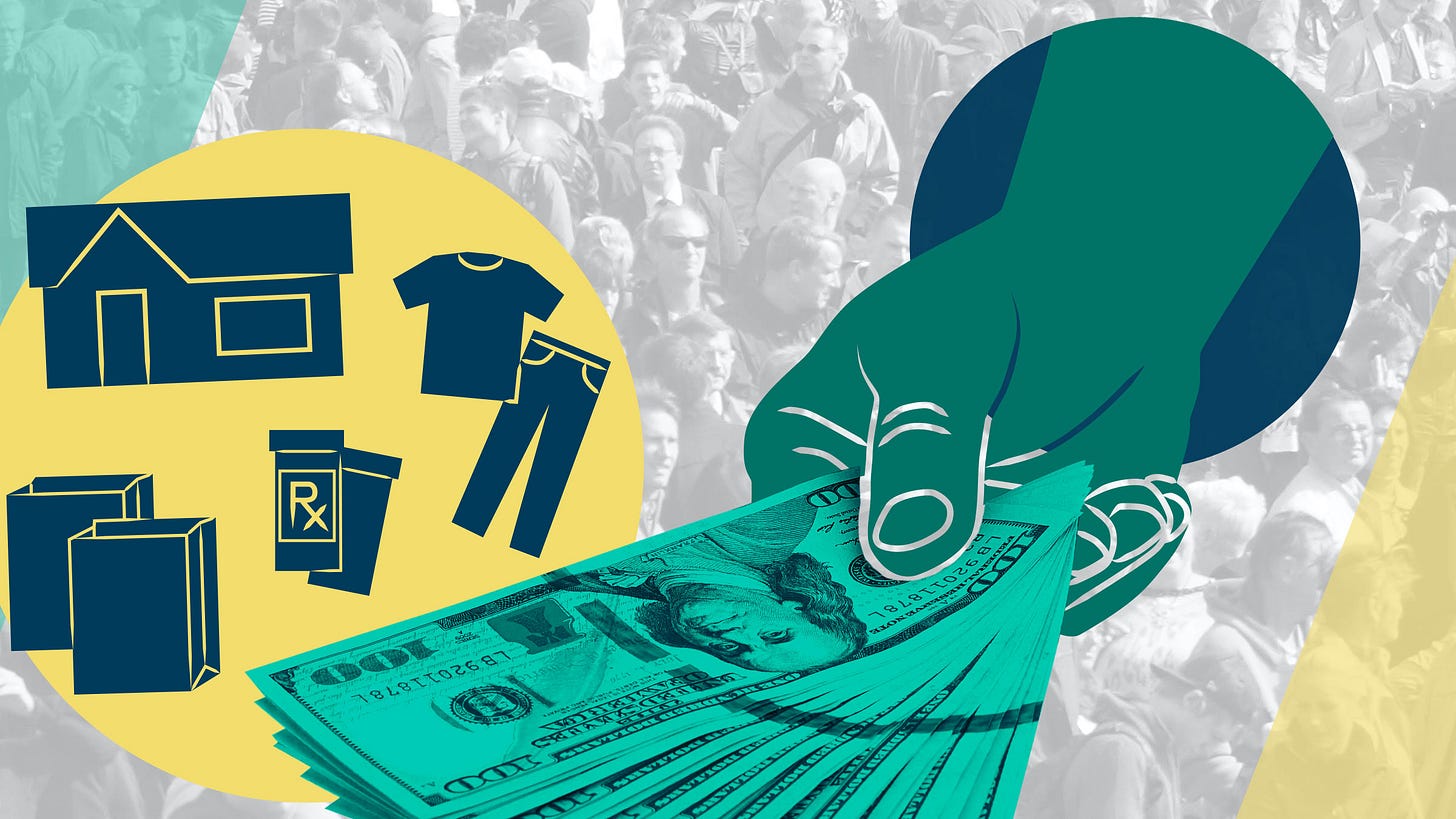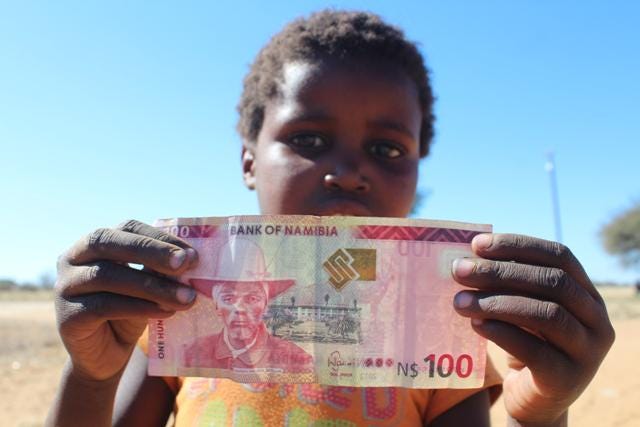Why do we keep trying to give people a basic income?
Hundreds of trials around the world have failed to prove that giving people free cash is worth doing. Still, the idea won't go away.
Another year, another study on whether giving people unconditional cash makes them less poor. Or more healthy. Or happy. Or something.
The latest research was funded by none other than Sam Altman, CEO of OpenAI and someone who may be worried about what will become of the restless mobs when ChatGPT eats their last brain cell.
Altman is among a list of tech bros who have expressed interest in unconditional cash transfers or universal basic income (UBI). It’s quite the list: Elon Musk, Mark Zuckerberg, Jack Dorsey, and Pierre Omidyar are all on board. As are countless governments, NGOs, and social commentators.
The idea is simple: provide every citizen with a guaranteed income, no strings attached.
However, despite the enduring popularity and the promise of addressing poverty and inequality, free money remains an impractical solution plagued by high costs, the need for significant taxation, and a lack of compelling evidence that it improves outcomes in the long term.
Take the recent OpenAI study, for example. It looked at what would happen if you gave $1,000 a month for three years to a bunch of low-income people in Texas and Illinois. The result was pretty much what every other study like this has found: essentially, unconditional cash provides a bit of short-term financial relief, but it does nothing to address the deeper systemic issues that create chronic poverty or restrict access to healthcare.
Time and time again, studies show that people don’t always spend the unconditional cash on their own education or skills training or starting their own businesses. In poor countries, they may buy food and send their kids to school. In higher income countries, they may party and spend more time relaxing, or get their teeth fixed. None of these are necessarily bad outcomes on their own, but the question is who should pay for it all?
Providing every citizen with a guaranteed income would require immense financial resources. In the United States, for example, a modest income of $1,000 a month for every adult would cost the country over $3 trillion annually. The Congressional Budget Office estimates 2024 revenues at $4.9 trillion, so the math doesn’t really work out without substantial taxation and wealth redistribution.
Still, literally hundreds of millions of dollars have been spent worldwide over the past several decades experimenting with different forms and modes of conditional and unconditional cash transfers. No country has yet adopted the idea at scale. Most governments can’t figure out how to pay for it or how to convince taxpayers of the need.
In addition, researchers often fail to account for basic human psychology and the importance of local culture when formulating their studies.
One of the most discussed experiments in unconditional cash transfers, known as the Basic Income Grant, or BIG, took place in the village of Otjivero, Namibia, about 60 miles east of the capital city of Windhoek. A dusty and wild settlement illegally set up by displaced farm workers who had nowhere else to go, Otjivero scored high on all the indicators of extreme poverty: no water, no jobs, no decent housing. One church worker described as a “living example of hell on earth.”
The government set up a pilot project in the early 2000s to give every one of the 1,000 inhabitants of Otjivero $100 Namibia dollars a month, or the equivalent of about $13 US. That doesn’t sound like a lot, but with a large family living under one roof it could easily begin to add up.
The money did make life better. Crime dropped and school attendance went up. People became healthier and better fed, though with such a low baseline to start from this isn’t entirely surprising.
Income per head of household didn’t go up, however, in part because the village’s population rose by about 30% during the time of the experiment, with family members moving to the village to stay with households receiving the cash. Contrary to expectations, only a small number of people started entrepreneurial businesses or invested in other economic pursuits. Savings didn’t amount to much.
Part of the reason for that, argues Professor Sabine Klocke-Daffa of Germany’s University of Tübingen, is that the local culture believes strongly in the concept of sharing and giving. Anyone in the village who was seen to keep possessions for themselves — or who lived in a nicer house, had expensive tech equipment, or drove a private car — ran the risk of being called stingy and ungenerous.
In Damara belief, life is only possible and livable as life in exchange. So, basically anything they possess is given to and shared with others. There are few justifications for refusing to share as the norm stipulates: “You must give if you have something and somebody comes and asks you for it.”
Where BIG money did serve individual or household priorities such as buying food-stuff at the local grocery stores, the beneficiaries made sure that the budget provided for enough food to be sent as a gift to needy neighbours or passing visitors.
A critical limitation of the decades of research on cash transfers so far, is that there is no long-term data. Most pilot programs are, by definition, short-lived so they fail to account for broader economic and social variables that could influence the results. Plus, as noted above, these studies often overlook cultural and psychological factors that play a crucial role in the success or failure of such programs.
No matter how many jobs are replaced by AI in our dystopian future, many societies still hold a strong belief in the value of hard work and self-reliance. A guaranteed income, regardless of employment status, will be taken as undermining to those values. Work doesn’t just provide financial security. It also gives us a sense of purpose and a place to connect with others socially. Removing the necessity to work leads to negative social dynamics like a breakdown in community cohesion and an increase in dependency on the state. We saw this clearly play out during COVID. Is this really the future we want (or worse, is it the future being planned for us)?
Even in the face of multiple studies that have shown it to be generally unsustainable, why does the fantasy of a universal income persist? Is it just a palatable way to quickly hasten in a collectivist utopia? Do we go more willingly to the gulag if we have a wad of cash in our pocket?
These are not easy questions and higher minds than ours have been grappling with them for decades. Even Friedrich Hayek, one of the best-known advocates of so-called Austrian economics, struggled with balancing the freedom of being able to live by one’s own rules with the need to prevent destitution and provide a minimum level of welfare:
In his book ‘The Fatal Conceit: The Errors of Socialism,’ he wrote:
I do not question any individual’s right voluntarily to withdraw from civilisation. But what “entitlements” do such persons have? Are we to subsidise their hermitages? There cannot be any entitlement to be exempted from the rules on which civilisation rests. We may be able to assist the weak and disabled, the very young and old, but only if the sane and adult submit to the impersonal discipline which gives us means to do so.
Whatever the future holds, expect to hear a louder drumbeat for UBI — especially from the uber-wealthy as they attempt to placate an increasingly displaced, disillusioned, and dissatisfied populace, while their wealth continues growing.
Bread and circuses worked in Rome, but not forever.




This is why “they” the WEF etc, want to bring in UBI that will be linked to a centralised social credit system. This will monitor every thing you do , eat and spend …so if you do not conform to their prescribed rules, $ will be deducted and access to amenities refused.
Appreciate you examining this concept and loved the Namibian example, where they place a high value on sharing. Thank You
Idk why they dont focus on instead changing the way we do capital allocation to labor instead, so everyone still has to do stuff, but they dont get to have free money for themselves, only allocated to others who do some sort of work. Is this still fraught with potential problems? Yes. But is it better than just blank check UBI? I cant imagine it wouldnt be worth investigating. Usually such proposals are referred to as subsidized labor, for those interested in learning more. Generally access to labor that is subsidized is only for individuals or small companies or whatever, and it phases out as pay goes up, and minimum wage is abolished or set at $1/hr or something.
On another note, I would be interested to know about the outliers in these studies. There have to have been some.